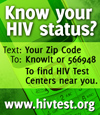Frequent Questions
Resources
Questions on This Page
Am I at risk for HIV?
How is HIV transmitted?
Which body fluids transmit HIV?
How can I protect myself from HIV transmission?
Other Resources
HIV can only be transmitted through certain body fluids. Specific behaviors may place you at higher risk for coming in contact with HIV. You may be at increased risk for HIV infection if you have:
- Injected drugs or steroids, during which needles or equipment were shared with others
- Had unprotected vaginal, anal, or oral sex with men who have sex with men, multiple partners, or anonymous partners
- Exchanges sex for drugs or money
- Been given a diagnosis or treated for hepatitis, tuberculosis (TB), or a sexually transmitted disease (STD)
- Received a blood transfusion during 1978-1985
- Had unprotected sex with anyone who has any of the risk factors listed above
The most common ways that HIV is transmitted from one person to another are:
- By having sex with an HIV-infected person
- By sharing needles or injection equipment with a person who is infected with HIV
- From HIV-infected women to their babies before or during birth, or through breast feeding
For more information visit How is HIV passed from one person to another? (Centers for Disease Control and Prevention)
Which body fluids transmit HIV?
The following body fluids have been shown to contain high concentrations of HIV:
- Blood
- Semen
- Vaginal fluid
- Breast milk
- Other body fluids containing blood
Other body fluids may contain small amounts of HIV, but small amounts of HIV does not necessarily mean that HIV can be transmitted by that body fluid.
For more information visit Which body fluids transmit HIV? (Centers for Disease Control and Prevention)How can I protect myself from HIV transmission?
The most effective to protect yourself from HIV transmission are to remember the ABCs:
- Abstain from sex
- Be faithful to you partner if you are having sex
- Condoms – use condoms if you are having sex
Other ways to protect yourself is to:
- Know the HIV-status of your partner
- Do not inject illicit drugs
- If you do inject drugs, never share needles or other equipment and use only clean needles and equipment
- Make getting an HIV test part of your regular medical checkup
For more information visit HIV and AIDS: Are You at Risk? (Centers for Disease Control and Prevention)
Other frequent questions and answers are available at:
- Prevention – Questions and Answers (Centers for Disease Control and Prevention)
- Transmission – Questions and Answers (Centers for Disease Control and Prevention)




 Did you know that the CDC has estimated that approximately 56,300 persons in the United States become infected with HIV each year?
Did you know that the CDC has estimated that approximately 56,300 persons in the United States become infected with HIV each year?